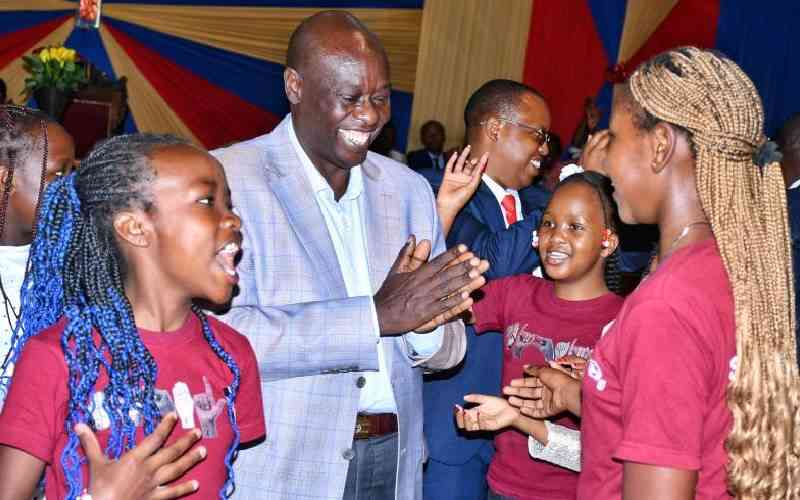The running theme during the two-week teachers' strike that ended a few days ago was that Kenyans don't show respect for teachers.
By respect, the officials of the Kenya National Union of Teachers (KNUT) and the Kenya Union of Post Primary Teachers (KUPPET) meant significant enhancement of the salaries and allowances of members.
If professional respect can be measured by the remuneration of employees, then the Kenyan society and the Government have demonstrated the highest respect to teachers.
The teaching fraternity suffers from a mistaken notion that other professionals in the civil service are better remunerated.
The Government duly recognises the professional orientation of teaching and has demonstrated this during the employment of fresh teachers.
The entry level of a graduate trained teacher into formal employment with the Teachers Service Commission (TSC) is Job Group K, as is the case with their professional counterparts who join the Public Service Commission (PSC) as engineers, economists, accountants, and physical planners, among others.
The entry level of majority of other civil servants—including District Officers, Assistant Secretaries, Information Officers, Probation Officers, Human Resource Officers, among others, is Job Group J.
Holders of Diploma certificates join the Civil Service at Job group H. The same applies to holders of a diploma in ducation who enter at Job H. It is evident that the Government has not given any preferential treatment to other civil servants, contrary to public perception.
The argument that society has low regard for teachers is therefore misplaced. The Government has had industrial disputes with its medical professionals, a cadre of professionals that society supposedly has the highest respect for. Therefore, such disputes are not evidence of the low regard society has for teachers.
An industrial dispute is in fact evidence of a functioning democracy. Disagreements over the terms of relations and revision of those terms does not in any way show that the employer has low regard for the employee.
The teachers' strike had nothing to do with a poor attitude the State allegedly has towards teachers.
The Government has harmonised the basic salaries of teachers with that of civil servants. In some respects, teachers enjoy enhanced salary levels compared to their other counterparts in the civil service.
The minimum salary of a chief Principal in Job group R, which is the highest post a teacher under TSC can hold, is Sh109,089 and rises through annual increments to a maximum of Sh144, 928. A civil servant at the same grade is paid a minimum salary of Sh109,089 on entry or promotion to Job group R and the maximum pay on this grade is Sh144,928.
A newly recruited graduate teacher in Job group K, which is the entry level of a graduate trained teacher starts at Sh31,020 and can eventually earn a maximum of Sh41,590 on that grade. His counterparts in the civil service get a starting salary of Sh31,020 and are entitled to a maximum of Sh41,590 by virtue of annual increments over time.
A fresh P1 teacher employed by the TSC in Job Group G is paid Sh16, 692 while his counterpart in the civil service starts gets a starting salary of Sh16,692, which progressively comes to a maximum of Sh21,304 over time. A civil servant of similar grade has a starting salary of Sh16,692 and a maximum of Sh21, 304.
Stay informed. Subscribe to our newsletter
There is virtual parity as far as basic pay is concerned between the teacher and the civil servant on the same job group. The idea of government not showing respect or recognition to the teacher therefore does not arise.
If the variety of allowances the government pays the teacher is taken into account, the gross salary of a newly recruited PI teacher is over Sh20,000.
This analysis shows that the teachers earn, on average, handsome salaries than civil servants. This demonstrates in no uncertain terms that society respects its teachers.
Clearly, teachers are being misled to believe that the Government treats them as minor employees. This is pure propaganda. The teachers' trade union movement should make demands on Government in the context of what the Government provides other civil servants who provide equally crucial service to the citizenry. Equity and common decency demands that.
The 300 per cent pay demand is wild. It is disingenuous to argue that the government can afford to pay MCAs and MPs and Senators so much money. Teachers should not emulate the insensitivity of some of our political leaders.
Two wrongs don't make a right. We should in fact mount a movement to urge elected leaders to reduce their salaries and other allowances, if anything.
 The Standard Group Plc is a
multi-media organization with investments in media platforms spanning newspaper
print operations, television, radio broadcasting, digital and online services. The
Standard Group is recognized as a leading multi-media house in Kenya with a key
influence in matters of national and international interest.
The Standard Group Plc is a
multi-media organization with investments in media platforms spanning newspaper
print operations, television, radio broadcasting, digital and online services. The
Standard Group is recognized as a leading multi-media house in Kenya with a key
influence in matters of national and international interest.
 The Standard Group Plc is a
multi-media organization with investments in media platforms spanning newspaper
print operations, television, radio broadcasting, digital and online services. The
Standard Group is recognized as a leading multi-media house in Kenya with a key
influence in matters of national and international interest.
The Standard Group Plc is a
multi-media organization with investments in media platforms spanning newspaper
print operations, television, radio broadcasting, digital and online services. The
Standard Group is recognized as a leading multi-media house in Kenya with a key
influence in matters of national and international interest.








